Recognising the value of research software and data
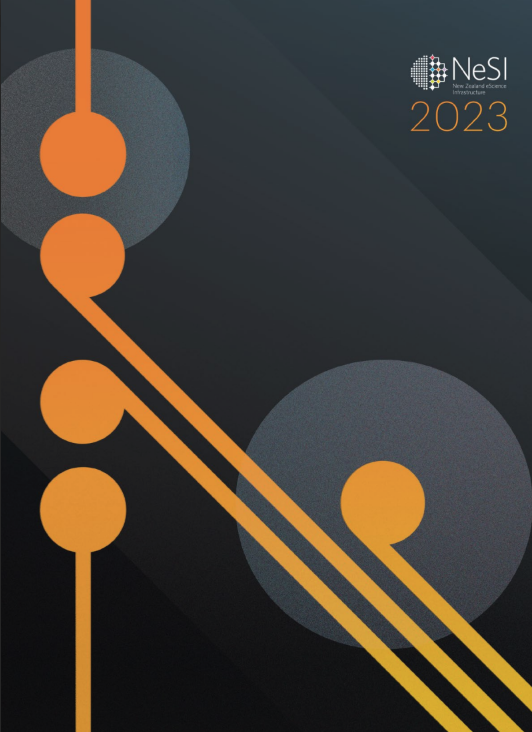
Each year NeSI publishes an Annual Review to celebrate the work we do,
the people we work with, and the groundwork we're laying for future directions.
Below is an excerpt from our 2023 Annual Review.
Throughout 2023 and into 2024, we've been looking at what we do to enable communities to truly value the contributions of research software and data in underpinning contemporary science.
Contributing to international kōrero
NeSI contributes to international software and data initiatives in order to bring learnings back into New Zealand’s local research communities. Last year we joined the Research Software Alliance (ReSA) as an Organisation Member, expanding our ability to participate in, learn from, and contribute to international efforts advancing the research software ecosystem. ReSA’s Executive Director Michelle Barker visited our Auckland office to discuss the ADORE software declaration and consider NeSI’s role in helping develop awareness around and support the sustainability of research software.
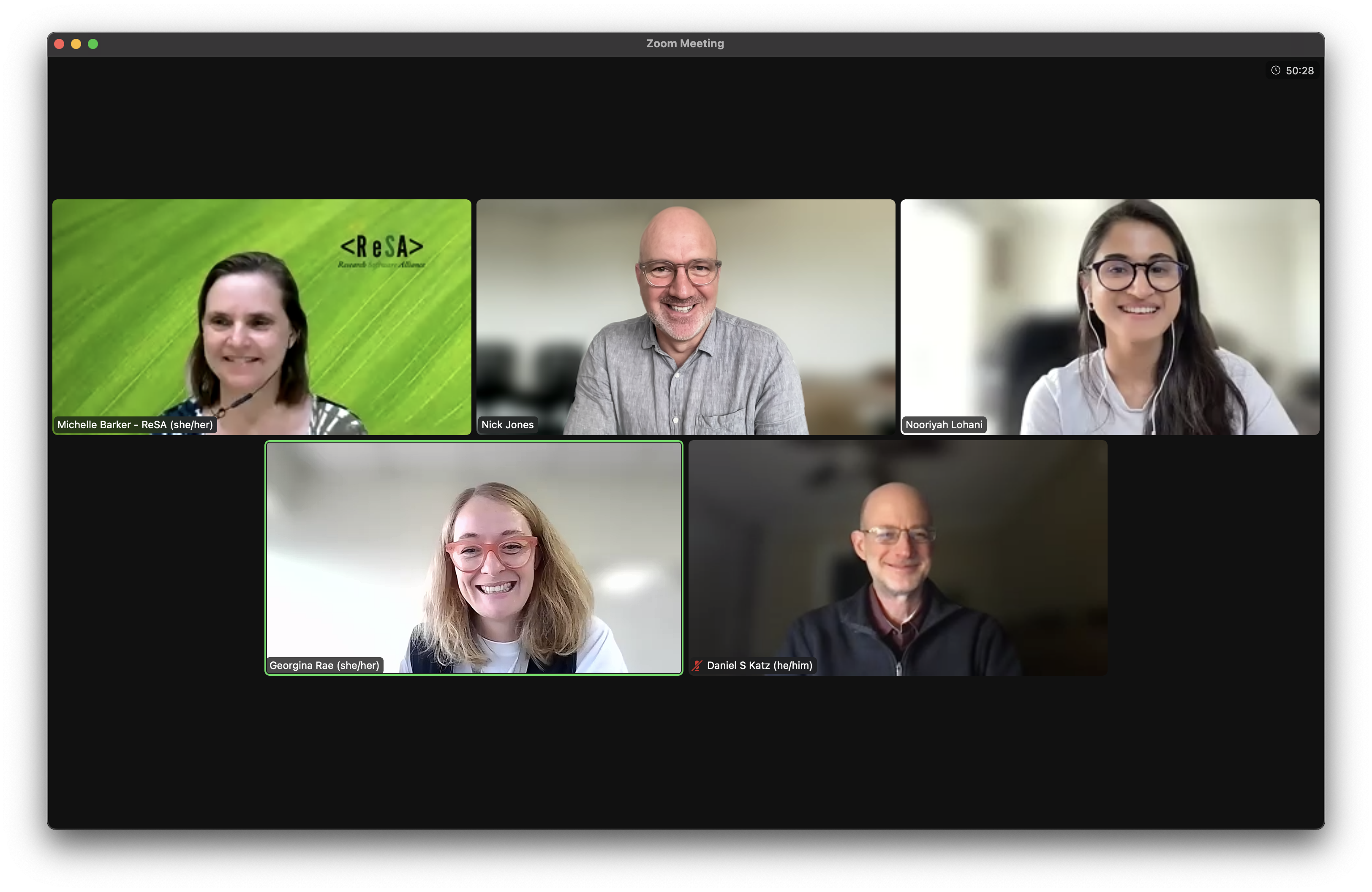
On a data front, NeSI has been a member of the Research Data Alliance (RDA) since its formation. Building from conversations at IDW and within the RDA’s Organisational Assembly, NeSI team members were part of a regional webinar on the benefits of RDA membership. There is emerging interest alongside ARDC colleagues on building closer collaborations and an “RDA Australasia” community. NeSI’s Product Manager - Data, Claire Rye, became co-chair of the World Data System (WDS) Early Career Researcher Network and is becoming more active in the WDS community.
Data discovery and access
NeSI is proud to be continuously supporting two significant projects dealing with culturally and scientifically significant data:
- the Rakeiora Genomics Platform, a proof-of-concept platform developed with mātauranga Māori and kaitiakitanga frameworks (https://rakeiora.ac.nz/). This work is informed by tikanga and Māori data governance principles combined with International standards for consent-based resource management embodying CARE principles (Collective benefit, Authority to control, Responsibility, Ethics), and
- the Aotearoa Genomic Data Repository (AGDR), a secure place for genomic researchers to store, browse, and request access to high value genomes of taonga species (https://data.agdr.org.nz/).
NeSI and Genomics Aotearoa continued to develop the AGDR last year, focusing on making the platform more robust and future-proof. This included adapting Gen3 (an open-source software platform) to support Aotearoa’s data sovereignty needs. Efforts included incorporating biocultural labels and notices, automating steps of the data submission process, and improving the deployment of AGDR through pipelines and shortly via helm charts.
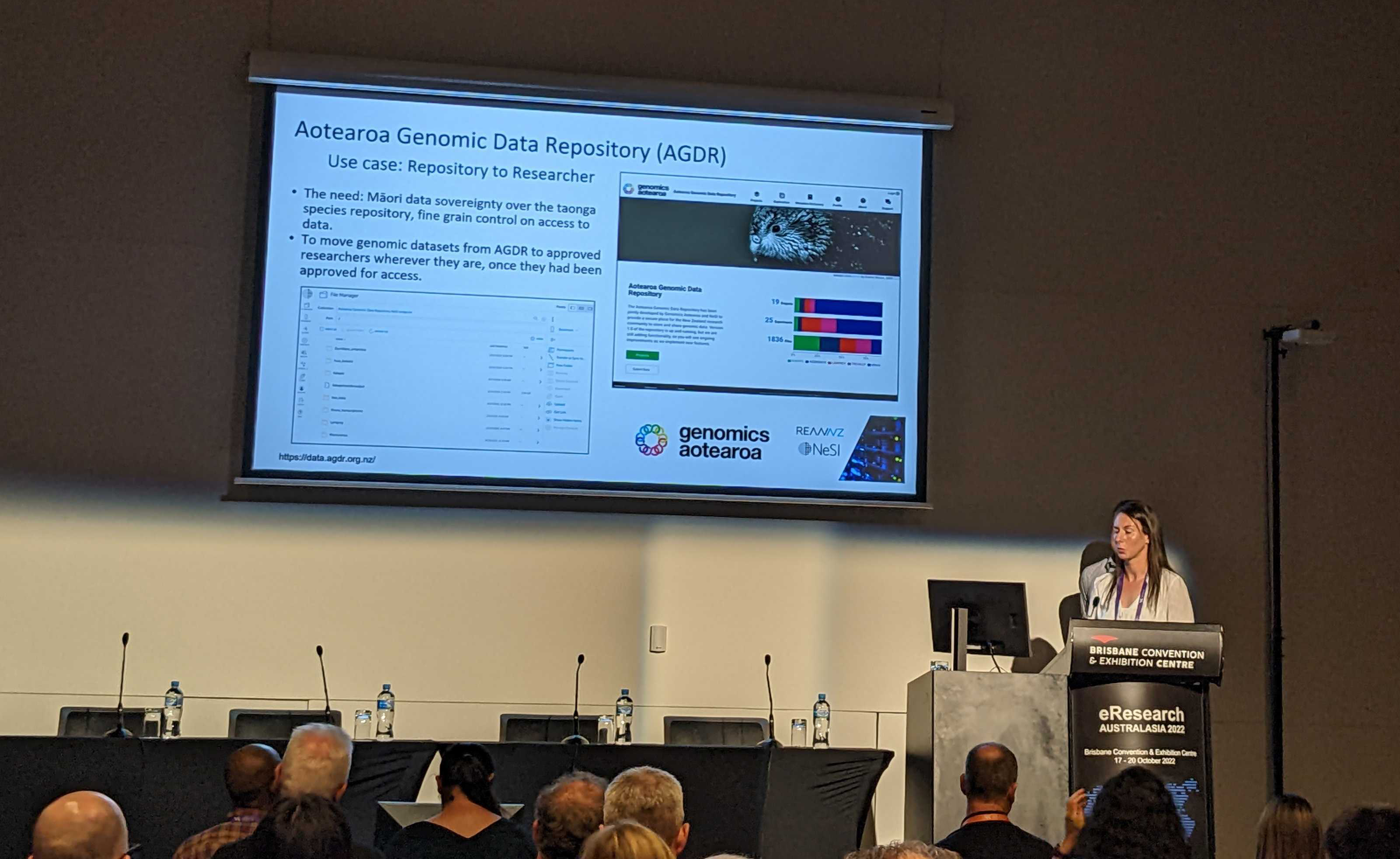
Much of this work has drawn interest from the wider Gen3 community, so NeSI team members are sharing insights and best practice as part of Gen3 Forums and other community knowledge networks. Claire Rye, NeSI Product Manager - Data has been part of Gen3's Community Steering Committee, which has led to new opportunities for collaboration and contribution internationally.
In the video featured above, NeSI's Eirian Perkins presented a talk, 'Spreadsheet-based data ingest with Gen3 dictionary-based validation', sharing use cases from the AGDR work as part of the Gen3 Community Forum in July 2023. To watch other Community Forum recordings, visit the Gen3 website.
Rakeiora is a collaboration between the University of Otago, Ngāti Porou Oranga, Ira Tātai Whakaheke, Institute of Environmental Science and Research (ESR), Waipapa Taumata Rau University of Auckland, and Genomics Aotearoa, and co-led with Māori partners. It has drawn on Kaupapa Māori and Action Learning methodologies throughout. In 2023, the project team finished the infrastructure prototype, concluding with the migration from Catalyst Cloud to NeSI’s own Flexible HPC environment, and receiving its Authority To Operate from the University of Auckland security team.
This allowed for the use of the system with the primary and tertiary care data for analysis and sharing early results with Ngāti Porou Oranga board, alongside demonstrations of the system to MBIE and more generally. NeSI team members shared lessons learned and reflections on the experience at the eResearch NZ and eResearch Australasia conferences and as part of a wider Rakeiora invited panel discussion at the 2023 New Zealand Association of Clinical Research Conference.
We are humbled and grateful to have been part of this project and take great pride in how both the collaboration approach and infrastructure was shaped by our Māori partners, with much generosity. This will inform further projects for meaningful impact in the future. The Rakeiora project team shared the final project report, including future recommendations, with MBIE in May 2023. Since then, we have worked with A/Prof Phil Wilcox and colleagues from the University of Otago to successfully onboard a Whakapapa workflow into the Rakeiora platform and test it with synthetic data.
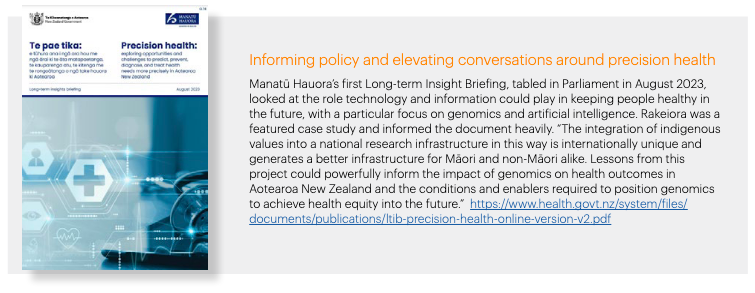
Data lifecycle management
Momentum around research data conversations in NZ is growing. NeSI's contributions to work by the Aotearoa Committee on Data in Research (CoDiR) and the Research Data Culture Conversations (RDCC) have been foundational to building a stronger sense of community and a base-line for developing impactful change. CoDiR has facilitated a series of workshops building out a view of the current landscape of research data in New Zealand.
Through RDCC, we engaged 14 institutions in the consultation process and were able to collect data volume estimates from 12 of them, enabling us to build NZ's first macro view of research data.
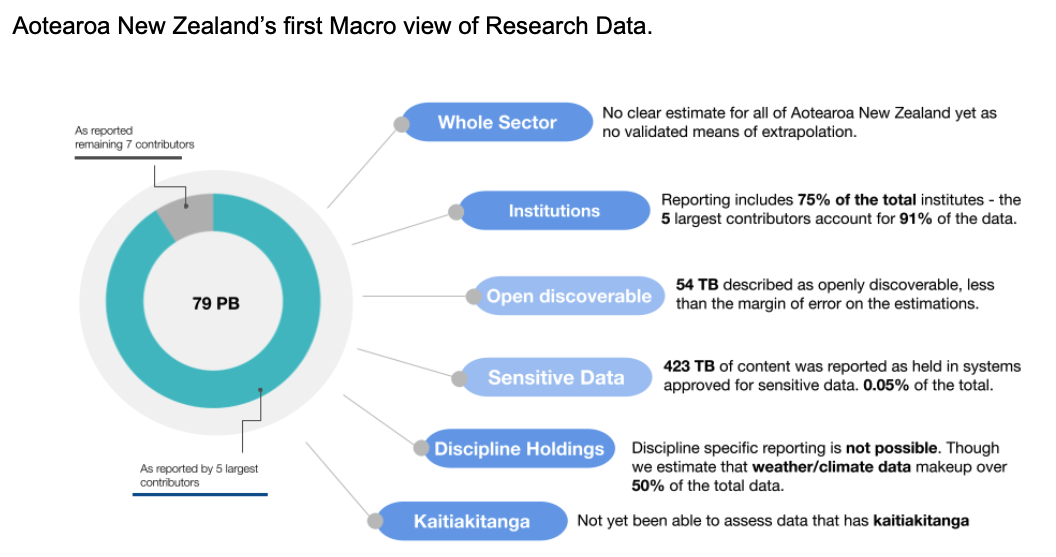
As part of our RDCC work, we've also sought to understand the Indigenous Data Sovereignty of research data held by New Zealand research institutions, which adds a crucial Aotearoa perspective. Further kōrero (conversation) is required, with guidance by Māori to refine how best to engage with this topic.
Preliminary results of the macro view were shared with contributing institutions, then later in the year at eResearch Australasia 2023 in Brisbane – winning the conference's poster competition – and to a global audience at International Data Week 2023 in Salzburg, Austria. This work has garnered much international recognition as a novel means of truly engaging with the challenge almost all research institutions face in governing research data.
Data transfer and sharing
The National Data Transfer Platform is a growing network of managed endpoints across Aotearoa, as part of Globus' international network. Australia joined the Globus network in 2022 opening the door for more trans-Tasman data transfers. NeSI and AARNET gave a joint talk at eResearch NZ 2023, highlighting case studies such as scientists at Plant and Food Research in New Zealand using Australian sequencing facilities and transferring the 3 TB of data back to Aotearoa in three hours to start the analysis.
Nationally, the network is supported through a partnership between NeSI, Globus, REANNZ, and New Zealand research institutions. In 2023 ESR joined the national endpoint network and conversations began with the University of Canterbury, the University of Waikato, and Bragato Research Institute. We've been learning more about Globus Connectors with Bragato, AgResearch and NeSI's own team, who are keen to trial how this could work with various cloud providers. NeSI successfully negotiated another Globus subscription term for the next three years, giving stability for conversations and growth going forwards. Usage of the National Data Transfer Platform continues to grow, with new peaks reached in late 2023 in the volume of data transferred (almost 300 TBs) and the number of Globus users (almost 100 people) across the national network.
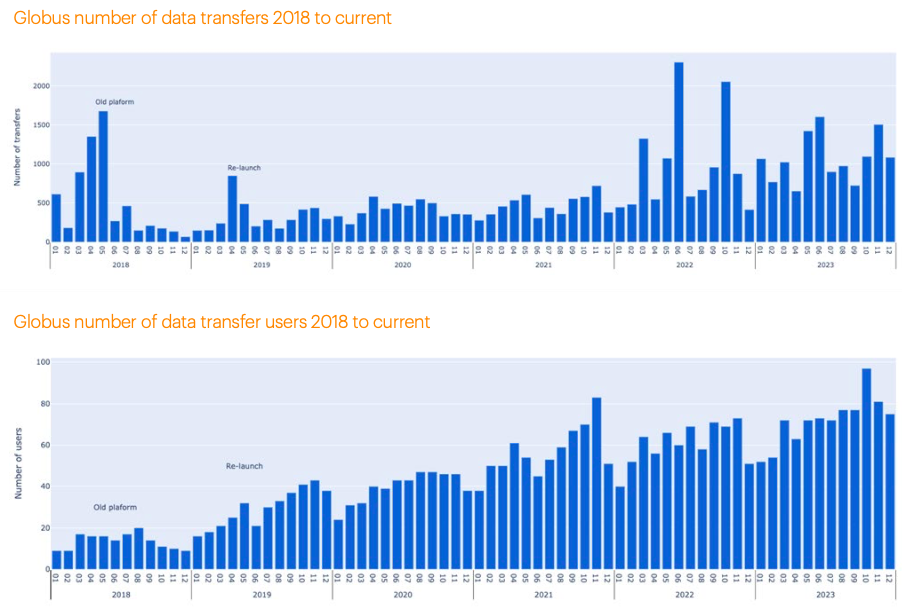
These are just some of the many partnerships and activities that kept us busy in 2023.
Click here to read more from our 2023 Annual Review.
If you'd like to receive a printed copy of our review, get in touch.





